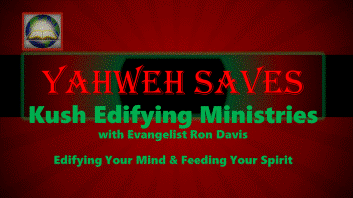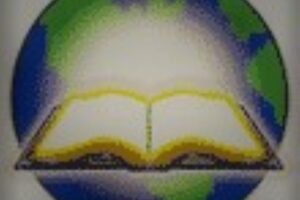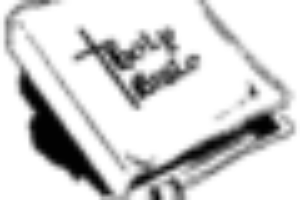
Kush Edifying Ministries
Evangelist Ron Davis, Minister of Yahweh
Approximate / Probable Year and/or Century the Books of the Bible Were Written
This information is given because in your study of the Holy Scriptures it will always be good to know when the specific book was written, because it helps in understanding any prophecies given by them. Especially, the books of Daniel and Ezekiel, and the others prophets who spoke after Israel and Judah went into captivity.
BOOKS OF THE OLD TESTAMENT (Covenant) BOOK PROBABLE (Year / Century)
Genesis* ———————————————————————————c.1250 – 1200 B.C.
Exodus*———————————————————————————–c.1250 – 1200 B.C.
Leviticus* ——————————————————————————–c.1250 – 1200 B.C.
Numbers*———————————————————————————c.1250 – 1200 B.C.
Deuteronomy* —————————————————————————c.1250 – 1200 B.C.
*NOTE: Some scholars believe the first five books of the Bible known as the Pentateuch are the oldest books in the Bible, written between 1446 and 1406 B.C.; however, there are many other scholars who believe the book Job is the oldest book in the Bible written around c.1500 B.C. The belief that the book of Job is the oldest book of the Bible is more likely to be true than the Pentateuch, because Job is making his own sacrifices at a place not prescribed by the laws of Moses given after the Israelites came out Egypt. If one believes that Moses wrote Genesis then the person called Job would have lived during or before Abraham time and the other patriarchs who made their own sacrifices to God (Elohim). They themselves performed the duties of priest for their household. [See Job 1:1-5 where Job made burnt offerings to sanctify his sons and daughters regularly at the end of the week of their feasting on each of the seven sons appointed feast day – these offerings by Job were made on Saturday, the Sabbath, for this is the last day of the week]. See my comments below under Job, also.
Joshua ———————————————————————————-c.1200 B.C.
Judges ———————————————————————————–c.1200 B.C.
Ruth————————————————————————————–c.1000 B.C.
1st Samuel———————————————————————————c.700 B.C.
2nd Samuel——————————————————————————–c.700 B.C.
1st Kings———————————————————————————- c.600 B.C.
2nd Kings———————————————————————————-c.600 B.C.
1st Chronicles —————————————————————————-c.350 B.C.
2nd Chronicles—————————————————————————–c.350 B.C.
Ezra—————————————————————————————–c.400 B.C.
Nehemiah———————————————————————————-c.400 B.C.
Tobit***————————————————————————————-c.200 B.C.
Judith***————————————————————————————c.150 B.C.
Esther—————————————————————————————c.300 B.C.
1st Maccabees***—————————————————————————c.100 B.C.
2nd Maccabees***————————————————————————–c.125 B.C.
Job** ————————————————————————————– c.1500 B.C.
**NOTE: The date above is the most likely date this book was written, but there are some scholars who debate this date claiming it was written around c. 500 B.C. However, the evidence within the books themselves gives us valid proof that Job was written around c. 1500 B.C. before the first five books of the Bible. One solid reason supporting this is that most scholars believe Moses wrote the first five books; and Job is picture in his book as making offerings to sanctify his sons and daughters a practice of the patriarchs before the Law of Moses. (Also, see note above). All references in the book Job show him to be a righteous man, a “blameless and upright, and one who feared God (Elohim) and shunned evil” (Job 1:1). Job most likely was a descendant of Shem (1 Ch. 1:17).
BOOK PROBABLE (Year / Century)
Psalms ——————————————————————————–c.500 B.C.
Proverbs——————————————————————————–c.450 B.C.
Ecclesiastes —————————————————————————-c.300 B.C.
Song of Songs————————————————————————-c.450 B.C.
Wisdom*** —————————————————————————c.100 B.C.
Sirach (Ecclesiasticus)***—————————————————————c.180 B.C.
Isaiah ———————————————————————————-c.700 B.C.
Jeremiah———————————————————————————c.585 B.C.
Lamentations —————————————————————————-c.550 B.C.
Baruch***———————————————————————————c.550 B.C.
Ezekiel ———————————————————————————–c.590 B.C.
Daniel————————————————————————————-c.165 B.C.
Hosea ————————————————————————————-c.750 B.C.
Joel—————————————————————————————-c.400 B.C.
Amos ————————————————————————————–c.750 B.C.
Obadiah————————————————————————————c.500 B.C.
Jonah ————————————————————————————-c.450 B.C.
Micah————————————————————————————–c.740 B.C.
Nahum ————————————————————————————c.612 B.C.
Habakkuk———————————————————————————-c.600 B.C.
Zephaniah ———————————————————————————c.620 B.C.
Haggai————————————————————————————–c.520 B.C.
Zechariah ———————————————————————————–c.520 B.C.
Malachi————————————————————————————–c.450 B.C.
***NOTE: The books below are not included in the books of the Bible that are recognized as authoritative by the churches today. The word they use is Canonical.
BOOK PROBABLE ____________________________________ (Year / Century)
Tobit —————————————————————————————-c.200 B.C.
Judith—————————————————————————————-c.150 B.C.
1st Maccabees ——————————————————————————c.100 B.C.
2nd Maccabees——————————————————————————c.125 B.C.
Wisdom ————————————————————————————-c.100 B.C.
Sirach (Ecclesiasticus)————————————————————————c.180 B.C.
Baruch —————————————————————————————c.550 B.C.
BOOKS OF THE NEW TESTAMENT BOOK PROBABLE (Year / Century)
Matthew ————————————————————————————-c.40-60 A.D.
Mark……………………………………………..………………………………………………………………………………………..c.45-60 A.D.
Luke ——————————————————————————————–57-60 A.D.
John——————————————————————————————-c.40-65 A.D.
Acts ——————————————————————————————–57-62 A.D.
Romans………………………………………………………………………………………………………………………………………………………57 A.D.
1 Corinthians ————————————————————————————–55 A.D.
2 Corinthians————————————————————————————–56 A.D.
Galatians ——————————————————————————————56 A.D.
Ephesians——————————————————————————————58 A.D.
Philippians —————————————————————————————–58 A.D.
Colossians——————————————————————————————58 A.D.
1 Thessalonians ————————————————————————————50 A.D.
2 Thessalonians———————————————————————————50-51 A.D.
1 Timothy ——————————————————————————————55 A.D.
2 Timothy——————————————————————————————-58 A.D.
Titus ————————————————————————————————57 A.D.
Philemon——————————————————————————————–58 A.D.
Hebrews ——————————————————————————————-c.67 A.D.
James———————————————————————————————–40’s A.D.
1 Peter ———————————————————————————————–65 A.D.
2 Peter——————————————————————————————–61-62 A.D.
1 John ——————————————————————————————–57-62 A.D.
2 John———————————————————————————————57-62 A.D.
3 John ———————————————————————————————57-62 A.D.
Jude————————————————————————————————61-62 A.D.
Revelation —————————————————————————————–68-70 A.D.
***Source for dates of New Testament: John A. T. Robinson, “Redating The New Testament” 1976.
Some Interesting Things about the Bible:
The books of the Bible were written over a period of some 1,500 years. They were written in various places and times. The Bible is a collection of books (or scrolls), with the earliest book or writing being recorded over 3500-3700 years ago. Moses in Exodus is said to have received the Ten Commandments (the Law of Moses, the Old Covenant) written on stone tablets by the finger of Elohim.
These early writings of the Holy Scriptures were written originally only in the Aramaic and Hebrew languages.
New Testament in its Original Order:
Matthew; Mark; Luke; John; Acts; James; 1 Peter; 2 Peter; 1 John; 2 John; 3 John; Jude; Romans; 1 Corinthians; 2 Corinthians; Galatians; Ephesians; Philippians; Colossians; 1 Thessalonians; 2 Thessalonians; Hebrews; 1 Timothy; 2 Timothy; Titus; Philemon; Revelation
This Original Order makes sense when you think of who the Word of Elohim was first entrusted to that is the Hebrews to remain with the tribe Judah until the Messiah comes at that the light were shine upon the Gentiles (Greeks and Romans). Those without the law of Moses as given to the Yahweh’s Inheritance, Israel – see Genesis 49:10; Isaiah 19:24-25; Romans 3:1-2; Acts 13:46-48.
The period of time (nearly 500 years) between the Old Covenant (commonly called Old Testament which has the same meaning as a covenant), and the New Covenant (commonly called the New Testament) where the Spirit of Yahweh provided no visions or sayings for the men of Elohim to write down. The prophet who wrote the book of Malachi, some claims it was the prophet Isaiah who recorded the last book of the Old Testament. Then the writer of Matthew pens the first book of the New Testament under the inspiration of the Holy Spirit.
By the time of New Testament the Gentiles spoke Greek and Latin languages had become the preferred languages of the Romans/Greeks Gentile-educated world with some educated Hebrews/Jews speaking these languages but the everyday Hebrew wrote and spoke the Hebrew dialect Aramaic – see Luke 23:38 where the languages above the Messiah Yahwehshua were “Greek, Latin, and Hebrew”; John 19:20 has it in this order “Aramaic, Latin, and Greek” either way if the everyday Jews read Greek then why not just write it in “Greek Only”? I mean think about what I’m saying here – the Romans/Greeks speaking Gentiles wrote it.
During the time of the Messiah, a Hebrew dialect called Aramaic was the common language of the Jews which were a mixed of the tribes of Levi, Judah and Benjamin – see 1 Kings 12. The sacred writings were always in the Hebrew and Aramaic dialect languages (Ezra 4:8 to 6:18 in Aramaic) for both the Old and New Covenant (Testament) to do otherwise would have been blasphemous and very dangerous for that person doing this thing.
The world teachings of the New Testament being written in the Greek is one of those outright lies on the Scriptures – see the text of the Scriptures as Scriptures interpret itself for proof Revelation 9:11; 16:16 (Hebrew used first); Paul and Barnabas went to the Jew first then to the Romans/Greek-Gentiles as it is written:
- Romans 3:1-2 World English Bible (WEB)…Then what advantage does the Jew have? Or what is the profit of circumcision? 2 Much in every way! Because first of all, they were entrusted with the revelations of God (Elohim).
- Acts 13:46 NIV…Then Paul and Barnabas answered them boldly: “We had to speak the word of God (Elohim) to you first. Since you reject it and do not consider yourselves worthy of eternal life, we now turn to the Gentiles.
***The Greek language was “NOT” used when the writings of the New Testament were penned. (Updated with new understandings over the years).
The apostle Paul wrote the majority of the books in the New Testament. The book of Hebrews is still in debate today as to who wrote it. However, many today love to attribute it to the apostle Paul for various reasons mostly tradition than anything else.
However, all the evidence of the book and other sources point to a person of the tribe of Levi writing it. The book of Hebrews is more than likely to have been written by another person besides the apostle Paul for at least two main reasons, there are more but I will let these two suffice for now.
First, the apostle Paul in his other books (which is 12 in all) always identifies himself as the writer or as the one who dictated them. Secondly, the book of Hebrews speaks more of the priesthood being changed and the law connecting the two writings and prophesies concerning the one called the Son of Yahweh, Yahwehshua; this Book writings are giving the impression that the writer may have been a member of the Aaronic priesthood or a Levite, Paul was a Benjaminite, not a Levite.
For the above listed reasons and other reasons based on the Scriptures this Ministry attribute the Holy Spirit inspired writings in the Book of Hebrews to the Disciple name “…Joseph a Levite from Cyprus, whom the apostles called Barnabas (which means “son of encouragement”)” – see Acts 4:36 and also Acts 9 v. 26-29.
Other interesting things and who wrote some of the books in the Holy Bible:
- The oldest book in the Bible is the book of Job written over 3500 years ago by an unknown man of Elohim, most likely it was one of Job’s friends who witnessed the things in it, if not Job himself.
- The last or youngest book in the Old Testament is the book of Malachi written between 400 and 450 B.C.
- The oldest book in the New Testament most likely is the book of James written between years 40 to 46 A.D.
- The last book of the New Testament is most likely the youngest book, the book of Revelation written probably between the years 68 to 95 A.D by the apostle John. I give it this span because of the various dates that are debated around it.
- The books of the Bible were written “originally” in two languages: the Hebrew and the Aramaic (a Hebrew Dialect), these were later translated by the Gentiles into the Koine Greek. The Old and New Testament were written in the Hebrew and Aramaic; and because the Word of Yahweh through the Apostle Paul opened to the Gentiles, the New Testament was later translated from the original Hebrew into the Koine Greek.
- Acts 13:47 NIV…For this is what the Lord (Yahweh) has commanded us: “‘I have made you a light for the Gentiles, that you may bring salvation to the ends of the earth.’ [Isaiah 49:6 and Acts 9 v. 15-16]”
- The first five books (known as the Pentateuch) are said by most that Moses wrote them. I think we can say, the vast amount of the books most likely were written by Moses with him dictating some to Joshua, the son of Nun, his assistant, who may have completed it during and after recording Moses death.
- The book of Joshua is said traditionally that Joshua wrote it; however, it is more probable that Joshua wrote some as well as one of his assistants.
- The historical books such as Judges, Ruth, 1st and 2nd Samuel, 1st and 2nd Kings, 1st and 2nd Chronicles and Esther (Mordecai probably penned this book), and the others most likely were penned by the Judges of the time.
- Book of Lamentations most say the prophet Jeremiah wrote it. The man of Elohim who wrote it was an eyewitness to the fall of Jerusalem around the 6th century by the Babylonians.
- The book of Psalms, a wisdom book were written by various individual men of Elohim, such as king David (the man of Elohim after Elohim’s heart) David, Asaph, Solomon the son of David (who received great wisdom above all on earth from Elohim – 1 Kings 3:12), the sons of Korah, Heman the Ezrahite, Ethan the Ezrahite, even one (Psalm 90) was written by Moses (the prophet who was a type of the Messiah – see Deuteronomy 18:15-16), and there are still some Psalms that are debated as unknown writers, wrote them.
- This book of wisdom, the Proverbs are another collection of sayings and writings of the time by various writers, to include Solomon who had much wisdom (Luke 11:31), a few verses of the proverbs and wisdom of these writings were penned by the men in the household of king Hezekiah. Men named Agur and Lemuel are mentioned in these proverbs as writers also.
- The other book of wisdom, Ecclesiastes commonly said to have been written by Solomon, which seems to be the most likely writer.
- Then we have the writings or shall we say history books of Ezra and Nehemiah. These books were originally one book as the Talmud (as the Old Testament is referred to by the Jews), and also in the traditional Hebrew bible of the Jews. These books were most likely written by the men Ezra and Nehemiah themselves, and also that some of the writings’ others penned, possibly by the scribes or Levites of the time.
- The book Song of Songs traditionally and commonly attributed to Solomon, which is also called the “Song of Solomon”. The very first verse attributed it to Solomon saying, “The song of songs, which is Solomon’s”.
- The book of Isaiah is the writing of this prophet himself. The book of Jeremiah is the writing of this prophet also.
- The book of Ezekiel is the writing of this prophet, and the book of Daniel is the writing this prophet.
- And the books of the “so-called” minor prophets (whatever that mean – I am still trying to figure out what’s a major prophet), Hosea, Joel, Amos, Obadiah, Jonah, Micah, Nahum, Habakkuk, Zephaniah, Haggai who gave us the exact dates of his writings (August, September, and December of 520 B.C.) were written by the prophets whose names the books are called by, and Zechariah (though the last few chapters 9-14 are said to be written by someone else possible Jeremiah) it’s also said to be dated in October 520 B.C., February 519 B.C., and December 518 B.C.
- The prophet Isaiah wrote the book called Malachi; this is because of the book of Mark quote in chapter one verses 2-3 (see also Isaiah 40:3). Also, the Hebrew for the word “Malachi” means “My messenger”.
- The books Matthew, Mark, Luke and John were by the apostles and men of God whose names the books were given. Also, Luke wrote the book of Acts.
- The apostle Paul wrote all the twelve books or epistles called Romans, 1st Corinthians, 2nd Corinthians, Galatians, Ephesians, Philippians, Colossians, 1st Thessalonians, 2nd Thessalonians, 1st Timothy, 2nd Timothy, and Philemon. In every one of these books (epistles), Paul identifies himself as the chief writer in the first few verses of the books every time.
- The book of Hebrews was written by a priest or Levite who became a follower of the Messiah, most likely the Disciple Barnabas translated in the Hebrew as “son of Encouragement” see Acts 4:36…”And Joses, [NU-Text reads Joseph] who was also named Barnabas by the apostles (which is translated Son of Encouragement), a Levite of the country of Cyprus”.
- There are a great many in the mainstream religious community who love to claim Paul wrote it even though most of them know better; yet they still say Paul wrote it out of their own traditions. Here again we see these leaders in the churches of this world using their own tradition to override fact and truth.
- It is beyond belief that this book would even be considered Paul’s in view of the style of all the others books he wrote. Paul always identified himself in all his other books. I ask this question, why didn’t he identify himself in Hebrews? See my note above, where I make comments about this book also.
- The books referred to by the names of the apostles and written by them are James, 1st Peter, 2nd Peter, 1 John, 2 John, 3 John, and Jude. As I said before the apostle John wrote the book of Revelation, and it was the last book written for the current Holy Scripture recordings.
The above information was gathered from many known public sources such as NKJV and NIV study bibles, and available Bible commentaries: the dates for the books of the Holy Bible were gathered from various sources and general web searches all in the public domain, as to this Ministry best knowledge. All comments are those of Evangelist Ron Davis, Minister of Messiah, of the Kush Edifying Ministries.
Click To Contact this Ministry



